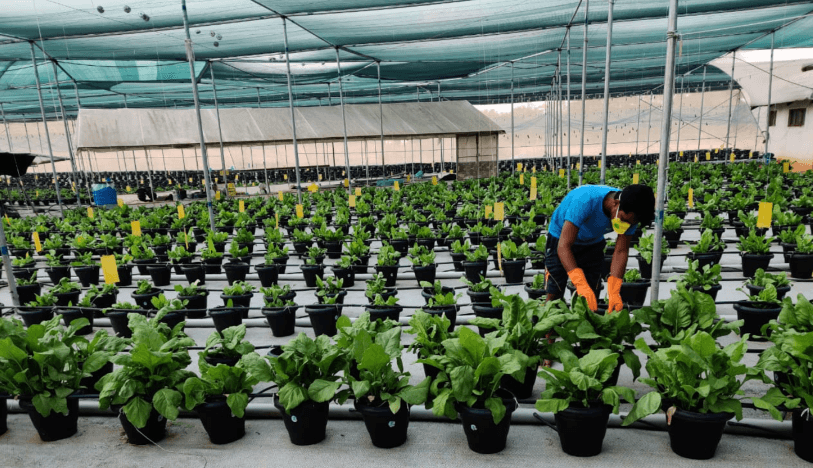
By Zahid H Javali
By 2023, Bangalore could well become a city of 1000 farms. The brainchild of Woolly Farms, a social enterprise incubated at the Indian Institute of Management, Bangalore, it is headquartered in HSR Layout. The initiative that began as a Business to Business venture, moved to serving consumers from June 2020 due to the pandemic. Woolly’s green strides received fresh impetus in July 2020 when Spar supermarket aligned with them to set up a 5000 sq. ft. rooftop farm on the 6th floor of their headquarters in Bangalore.
Earlier, the startup was paying rent to those who allowed them to grow a farm on their rooftops and other open spaces. Today, the idea is more inclusive. They want you to either buy groceries from them online or invest, monetarily or otherwise, in greening the city for the long-term by becoming a member.
Rooftop farms cool down your home temperature and also turn you into a micro entrepreneur. With an investment of Rs 4 lakh, you could have a terrace garden of 1000 sq. ft and earn Rs 6,000-8,000 a month for 12 years. However, the firm is looking at people who are deeply interested in urban farming, rather than those who only see it as a business model. “Our mission is to have a 1000-people strong community that will fight for better food in the system and pave the way for a healthy urban movement,” says Bushair AP, CEO, Woolly Farms. “Twenty-three urban farms are in various stages of construction in Bangalore. Till February next year, we will continue to build 5-6 farms every month. After March 2021, we will go in for rapid installation and scaling up in a cluster-wise manner across the city.”
The idea is to work with like-minded souls in bettering the agricultural landscape in the country. “To become a member, you don’t have to invest in farming,” says Bushair. “You could just give us your feedback on how we can better the agricultural system in our country by being part of this largest urban farming network.”
The mission is to bring down the price of organically-grown produce to the level of the hybrid variety in seven years. “By offering the price advantage, we want to create a pressure on the prevailing ecosystem,” says Bushair. “The outcome of our agricultural system should be a healthy human compared to what it is now: quell hunger. Therefore, we want to make organic vegetables affordable to the masses.”
Woolly sources its produce from its four acres of farms spread across the city. But that is not enough to fulfil the current demand. Therefore, the firm is aiming to add 24 acres before March 2021. “Right now, we are training and building skill sets to fulfil the immediate needs of managing our farms,” says Bushair. “We have already enabled hundreds of people across India to set up independent farms. In the long run, we want to use all our knowledge and create a university for scientific and sustainable agriculture.”
If you don’t want to invest in the enterprise, you can still get farm-fresh food right to your doorstep within minutes after harvest by ordering online (no deliveries on Sunday though). The firm has its agrihubs in Devanahalli, Hennur, Bannerghatta Road, Sarjapur Road, HSR Layout and Electronic City. The prices are 50-100 percent more than the traditionally-grown food. Besides, some items are priced 10-20% higher than the other organic food available in the market. Ofcourse, this is for a reason: you are getting farm-fresh food within minutes of the harvest, and usually food grown in your own neighbourhood. For example, Woolly is selling organic tomatoes for Rs 70 a kilo while one of their competitors is selling for Rs 40. At Woolly, you have to buy for a minimum of Rs 200 to checkout (with Rs 50 as deliver charge). For free shipping, you have to buy for a minimum of Rs 500, which is cheaper than the other grocery providers who require you to spend Rs 600. While the firm’s competitors buy food direct from the farmers, and some sell it under their private label, you have no way of visiting their farm to verify the authenticity of the groceries you buy. With Woolly, you can visit the farms in your neighbourhood, and also understand their new-age farming techniques (Hydroponics, Aeroponics, Bio-mimicry, and Permaculture). That is why they have a facility for you to become a member, so you can visit their farms, take part in farm pluck, get early access to their new harvests and seasonal items from partnered farms. However, you need to hurry as there are only 1500 spots available.
Enthused by a new-found passion for farming and better health, many households across Bangalore have taken up rooftop farming, including Whitefield, Hebbal, Indiranagar, Marathahalli, and Bannerghatta Road, among others. Each terrace is used for a specific crop to maximize the yield and control the temperature. “This leads to much communal sharing and information exchange,” says Nithun KV, co-founder, Woolly Farms. “Ours is a customer-to-customer urban farming and sharing platform. We are building and applying agricultural techniques like vertical farming, combined with hydroponics, data science and mobile technology to help people become self-sustainable for vegetables and herbs.”
No mud here as the vegetables grow in plastic tubs and pouches filled with coco peat that has a remarkable capacity to store water, so you don’t have to water all the time. Cocopeat is also nutritious, so there is no need for fertilisers, pesticides and herbicides that could ruin your yield. Forget about leaks and muddy filth on your terraces and balconies. This is new-age farming meant for urban areas where space is at a premium. For a visual demo, you can watch this video on Woolly Farms and this presentation on how the firm plans to have a thousand urban farms in the next three years. Bangalore is not alone. The company is also in talks with people in Mumbai, Chennai, Hyderabad, and Delhi. “We want to build the largest urban farming concept in the world and redefine urban food productivity,” says Bushair. “We are looking at institutions and communities to take this forward.”
Want to set up your own mini greenhouse in your balcony, terrace or vacant land? Woolly’s concept is perfect for homegrowers, land sharers or green corporations. Contact Woolly now.




